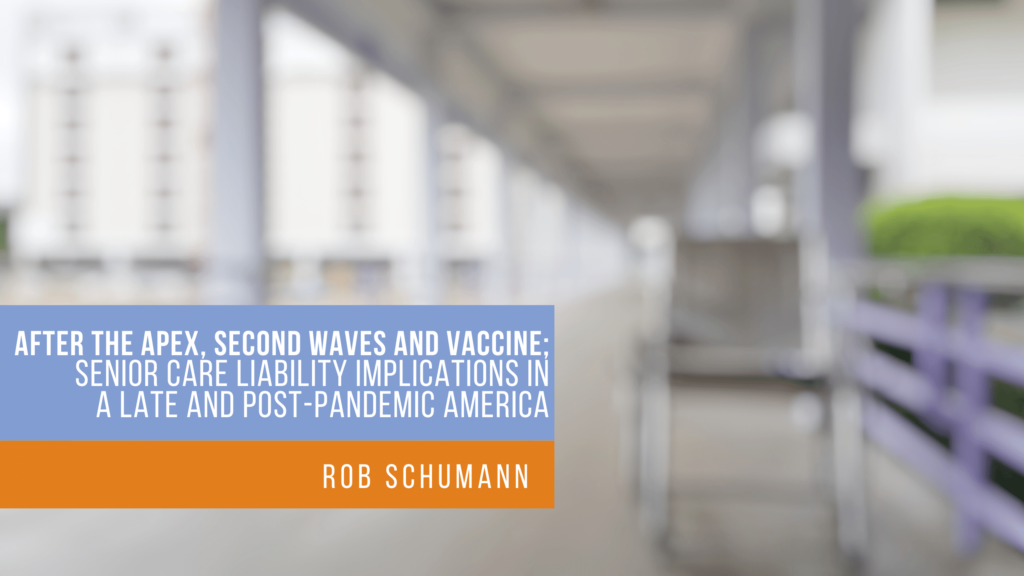Propel provides innovative insurance solutions to thousands of companies across the country. We make it our business to know your world inside and out.
Senior Care
After the Apex, Second Waves and Vaccine; Senior Care Liability Implications in a Late and Post-Pandemic America
The storm most never saw coming was still a bit offshore as America’s senior care leaders gathered at the 2020 Spring NIC the week of March 2, 2020, in San Diego. The hand sanitizer was out, and elbow bumps at times replaced handshakes, but things were generally the same with meetings, gatherings, and meals. It was different but not that different. As this meeting unfolded, however, and conference participants returned home, the first major American outbreak of the new and peculiar coronavirus was firmly gripping the Life Care Center skilled nursing facility in Kirkland, WA.
Already making national news but not necessarily fully hitting the radars and conversations of senior care insurance players, this particular outbreak would prove to be the index case for the calamity that followed and would provide blueprints and case studies with far-reaching implications respecting liability, immunity, and defensibility for the thousands of senior living and care communities that would follow it. In the days and weeks after, insurance carriers and brokers were forced to grapple with unanswerable questions primarily related to liability and business interruption while simultaneously dealing with the personal upheaval of shifting their businesses to remote settings and arranging for children to be home full time.
Initially, and despite the widespread national lockdowns, it remained unclear if the virus might be able to be contained geographically or if it would ultimately (as it came to do) infiltrate virtually every senior living and care community in the nation. The result of this uncertainty was trying to make sense of what may or may not be covered, what should be reported (and when), what carriers might issue cancellations/non-renewals and what governmentally issued immunity orders, and newly created carrier Pandemic exclusions might mean. As we quickly approach the year anniversary of the pandemic declaration, some of the answers to these questions are becoming and have become much clearer.
The market for liability insurance had entered a hardened cycle roughly a year before the coronavirus crisis began. The initial panic during the onset of the pandemic exacerbated the intensity of the hardened market, but this would prove to be short-lived. Perhaps the best insurance news from the Spring of 2020 was that the carrier community proved resilient; we never experienced a frozen insurance market. Contributions to this steadiness included then HHS Secretary Alex Azar’s invocation of the PREP Act retroactive to February, steady state-level executive and legislative immunity orders that most certainly extended to senior care providers, and the swift action by carrier legal counsel to craft language for Coronavirus/Pandemic/Public Health Emergency exclusions that would be affixed to virtually all new business and renewal liability policies as early as April 1, 2020. Essentially the pot got real hot, but the contents never boiled over.
As the calendar turned to late spring and summer, there seemed to be real reasons for hope on the insurance front. Dialogue with key carrier trading partners reflected very appropriate, sophisticated, and measured responses. The new exclusions were not “cut and run” gestures but merely an acknowledgment that, as Chubb CEO Evan Greenberg stated, “Insurer balance sheets are finite. Pandemic losses are infinite.” This statement resonated, and the exclusions were able to go mainstream in the same manner as War, Nuclear, and Asbestos because all the resources of the insurance market in the aggregate are not sufficient to cover such uninsurable losses.
Early returns suggested that legal action which was being pursued (despite an ongoing and raging national crisis) was emanating from lower-tier firms looking for a pot of gold at the end of the rainbow and not by firms more commonly associated with senior care litigation. The PREP Act and state-level immunities were very specific that only gross negligence, intentional acts, and willful misconduct were potential challenges to immunity extended; by all accounts, high hurdles to clear and prove. Carriers suggested that the longer and more widespread the pandemic became, the more defensible it became. They indicated that in lieu of an unsustainable stacking of policy limits and an unabated stretch of limit loss wrongful death settlements that we were dealing with what would largely amount to a defense cost event; the incurring of some level of legal and investigative costs for incidents and suits that get filed pre-exclusion and in spite of immunity protections. Such defense cost event circumstances will undoubtedly extend to providers in a post-exclusion and post Emergency Declaration expiration environment, but we are hopeful that such items will be more the exception than the rule.
As of this writing, two landmark rulings have dramatically improved the outlook for how courts might rule in matters brought against senior care providers related to Covid-19 going forward. The first is related to the aforementioned Life Care Center of Kirkland. On September 22, State Administrative Law Judge Matt Perkins ruled (regarding the imposition of state and federal deficiency tags and penalties during a survey from March 6-16) that;
the Department provided relatively little evidence that the facility actually failed to meet any expected standard of care or failed to follow public health guidelines. In a general sense, the Department seems to have reasoned that, because the outcome was tragic, LCCK must have failed to adequately care for their patients; this idea is based on hindsight.
Decision 35. The ALJ concludes that the facility did not violate state rules on physician services, infection control, general administration, medical director, clinical records, quality assessment and assurance, and quality of care, as alleged by the state, although it violated some requirements. Id. 35-42. He rules that the Department abused its discretion by issuing the stop placement order but acted within its discretion when it imposed conditions on the facility’s license.
The Centers for Medicare & Medicaid Services cited deficiencies and imposed $611,325 in civil money penalties. A federal administrative appeal of the deficiencies and penalties is scheduled for April 2021.
The second and most recent is in the matter of Gilbert Garcia et al. vs. Welltower OpCo, LLC et al. issued February 10, 2021, confirming that senior care providers are “covered persons” under the PREP Act when “covered countermeasures” are taken and in the absence of willful misconduct;
In the August 14, 2020 Letter addressing the
status of senior living communities, OGC confirms that senior
living communities are covered persons under the PREP Act
because they are “program planners.” Dkt. No. No. 31-4 at
2-3 (“Aug. 14, 2020, Senior Living Communities Letter”).
[A] senior living community meets the definition of a‘program planner’ to the extent that it supervises or
administers a program with respect to the administration,
dispensing, distribution, provision, or use of a security
countermeasure or a qualified pandemic or epidemic
product, including by ‘provid[ing] a facility to administer
or use a Covered Countermeasure in accordance with’ the
declaration).3
Id. at 2-3.
Much like the introduction and uptake of effective vaccines, these landmark rulings provide a good reason for optimism. Couple these with the notion that the country and world have now seen more clearly than ever the importance that senior care providers play in the health care system and society at large. Massive public policy consequences would be had if the government and legal system created a cushy environment for frivolous lawsuits against well-meaning providers to survive and thrive. A second pandemic of expensive and wasteful litigation is the last thing this country needs as it prepares to emerge from the quagmire to confront the aftermath and rebuild.
We believe that the nation’s senior care providers, vital participants in the American economy, will continue to confront significant challenges but that there are plenty of green shoots to be optimistic about. It is key to note that a recent survey in Skilled Nursing News noted claims and lawsuits as among the lower priority items for operators; vastly less concerning than worries about occupancy and labor. The liability insurance market continues to be restrictive with terms and conditions and most often includes premium and deductible increases, but it continues to function efficiently. There is sufficient capacity available for all coverage lines, and it could be argued that besides external factors related to the ongoing crisis, that this hard market has not approached or surpassed the last one from 2001-2005. In some cases, there are signs of an early spring with tempered increases, early quotes, and new market entrants and programs forthcoming.
At Propel, we believe in the senior living and care industry and have sworn to deploy all of the resources possible to support and add momentum to our client partners’ efforts. We are in constant contact with carrier trading partners to share people’s stories and advocate for the best possible treatment and results. We have all been through a lot over the past year, no one more than senior care providers and residents, but we have learned many lessons, and these will unquestionably serve us well in the months and years that lie ahead.
*This article is intended to be informational only and does not constitute insurance advice. For insurance advice, please contact a member of the Propel Senior Care team or consult with your licensed agent/broker.

Rob Schumann
With over 20 years of experience and a focus on senior care, Rob always finds new ways to help his clients. In high school, Rob worked in a senior care facility and developed a passion for the residents as well as the industry. He enjoys working closely with his clients, building relationships, and maintaining long-term trust and reliability. Rob’s goal is to solve problems and accelerate his clients’ success. More about Rob...


